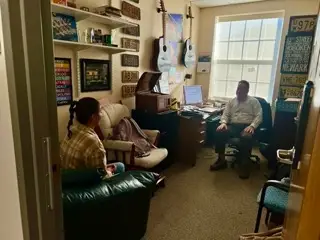One of the challenges of being a college student is knowing how and when to communicate with professors. Students may also find it difficult to reach out for help from other campus resources. These can be simple and beneficial skills if done correctly.
SNHU professors and professional staff were surveyed to help with common communication opportunities for students.
How and When to Contact a Professor
SNHU’s “official” communications channels are email and Microsoft Teams. The best way to reach a professor is an email sent during normal business hours (Monday through Friday between 9am and 5pm). Communication Assistant Professor Dave Humphreys said that while the time of day doesn’t matter, don’t expect an immediate reply if it’s outside of “school” hours.
Professors also hold “office hours,” which are designated times to be available for student contact. Many professors have open-door policies, meaning that if their office door is open, students are welcome to drop in.
Students will have easier access to faculty and services if they don’t save assignments to nights and weekends. Otherwise, prepare to wait until regular business hours for a response.
Texting professors is usually not recommended; however, if an emergency arises, students should include their first and last names so the professors will know which “Hailey” is texting.
If emailing someone, start the email professionally, with “Dear Professor,” rather than “Hey.” Remember that this is still a business communique.
Deadlines and Late Work
Just like in the world outside of academia, deadlines must be met. While some high schools accepted late work, colleges generally don’t. Professors explain their late work policies on the syllabus. Students are responsible for reading the syllabus and knowing deadline rules without expecting reminders. Once again, proper communication is the key.
“While I don’t accept late work, if my students communicate with me about challenges they are having, we can develop a plan together to make sure they are on the path to being successful,” said English Department Lecturer Selina Marcille. “I can’t say yes or no definitively for others, but if you are regularly communicative with your instructors, you have a better shot of them working with you when things do come up that prevent you from submitting work on time.”
Missed and Misunderstood Assignments
The best advice is to not miss an assignment, but when that happens, students should communicate with their professor immediately. That’s also true for misunderstood directions. Attending office hours sends a positive message that the students take their work seriously.
An email or Teams message is also acceptable but should be sent as soon as possible. Look at Brightspace for additional resources or clarifications. Sometimes professors give second chances for incorrectly completed assignments. Never be afraid to ask.
Don’t skip the next class because of a missed assignment. Professors are looking to help students, not penalize them. Don’t wait and then ask for “extra credit” assignments at the end of the semester. That creates more work for the professor because a student didn’t do the work.
Appealing a Grade
When done respectfully, appealing a grade is a great way to work with a professor. An in-person conversation during office hours is the best method. Rather than a defensive confrontation, ask the professor what would have helped make the assignment better. Explain the thought process that went into the assignment. This helps demonstrate an understanding of the material or can better pinpoint where and how the professor can help.
“I’m always happy to have a conversation surrounding grades. Mistakes can be made and sometimes it’s good to have your point of view. If you have any concerns, just reach out or grab me after class,” said Humphreys.
Learning Center Referrals
SNHU has many resources to help students, ranging from Residence Life to Wellness to the Wolak Learning Center, located on the second floor of the SNHU Library. All of these are included as part of tuition and should be taken advantage of.
One benefit of SNHU’s small, in-person classes is that professors get to know individual students and can see when they may struggle. In those cases, they may recommend that the student reach out to the Wolak Learning Center for help. That doesn’t mean the student is failing – it means the professor thinks the student can do their best work with a little more guidance. For some students, it can make the difference between passing or failing, while for others it can help a B student earn an A.
“Our peer educators are available to help you take a positive step towards meeting your own academic goals,” said Ashley Liadis, Director of the Wolak Learning Center. “Tutoring is available to all students; in fact, some of our own peer educators are tutored by other peer educators on our team.” Students can also request academic assistance on their own.
Conflict Resolution
In the event of a conflict, students should always speak with their professor first. If that does not solve the issue, there are next steps. The department coordinator comes next, and the department chair is always a good first step, followed by the dean if that professor happens to be the chair.
“Ultimately, if you’re facing a situation like that, it might be worth it to have a conversation with another trusted third-party faculty member to get their opinion on how to proceed,” said Humphreys.
By communicating and working with professors, students are likely to find a receptive partner in their education, and receive any assistance needed to help them be the best they can be.




